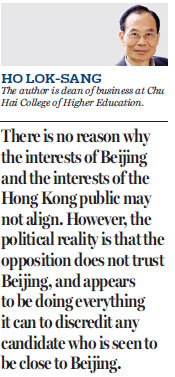Hong Kong badly needs an enlightened opposition
Updated: 2017-01-10 07:36
By Ho Lok-sang(HK Edition)
|
|||||||
Ho Lok-sang writes that the opposition has not been fair about the performance of Leung Chun-ying as CE and has overlooked some solid achievements - such as boosting housing supply and increasing the Old Age Allowance
There has been much discussion about the necessary or desirable qualities of our next SAR Chief Executive. Director of the Hong Kong and Macao Affairs Office Wang Guangya mentioned four: He or she must love the country and love Hong Kong; must have the ability of ruling; must win the trust of the central government; and must win the support of the Hong Kong public. In my opinion, the most serious contenders of the post do meet these basic requirements. Self-selection will mean that most of the contenders should have the necessary leadership skills and administrative ability and should be able to win the trust of Beijing and that of the Hong Kong public.
Obviously not everybody will agree with my optimism. Some people point their fingers at current CE Leung Chun-ying and claim that he does not have the support of Hong Kong people. For months the opposition had wanted "ABC" - "Anyone But CY" - and was particularly adept at spreading this hatred of Leung among the public.
After Leung announced that he would not run for a second term, the opposition readily changed their target. On the internet, an image was circulated of Leung superimposed on the frames of Regina Ip Lau Suk-yee and Carrie Lam Cheng Yuet-ngor. Ip and Lam were portrayed as just another Leung.

The irony is that the opposition is hard put to spell out exactly what policy Leung introduced in Hong Kong that is so appalling. Leung worked hard to boost housing supply; set up the Sales of First-hand Residential Properties Authority; introduced the Low-income Working Family Allowance; raised the Old Age Allowance; dealt effectively with the baby formula shortage problem; stopped all baby delivery appointments from mainland residents, effectively returning all the maternity ward quotas to Hong Kong people; and introduced a scheme that allows children enrolled in regular kindergartens almost full coverage for tuition fees, effectively extending the period of free education to 15 years starting in September 2017. Leung is going to step down soon, and he is going to set up the Study Subsidy Scheme for Designated Professions/Sectors, which will ease the financial burden for students.
Like all governments, Leung's, of course, made mistakes from time to time, and there are always some specific things that people complain about. But everything needs to be looked at with a sense of proportion. The latest uproar is about the decision by the administration to locate the proposed miniature Palace Museum in the West Kowloon Cultural District without proper consultation. Carrie Lam explained that the negotiation between Beijing and Hong Kong over the matter had to be held in strict confidence. The opposition is not satisfied. But it needs to understand that this is a sensitive issue, given that many cities on the mainland would wish that any new Palace Museum be located there. If the public needed to be consulted on whether they wanted it, the mainland cities would also have every reason to ask Beijing to open the site of the mini-Palace Museum to competition among all the cities in China. After all, the mini-Palace Museum will be a tremendous asset that will boost Hong Kong's tourism industry. It may even help attract important business meetings and conferences to Hong Kong, and the potential benefits would then be much bigger than just the additional tourist numbers.
This brings up the question of whether someone who is trusted by Beijing may just not win the support of the public, and conversely whether someone who wins the support of the public just may not win the trust of Beijing. To me it is absurd to think so, because there is no reason why the interests of Beijing and the interests of the Hong Kong public may not align. However, the political reality is that the opposition does not trust Beijing, and appears to be doing everything it can to discredit any candidate who is seen to be close to Beijing. This perhaps is the "original sin" of Leung. What other reason can we think of to explain why the opposition hates him so much - notwithstanding the obviously many good things that he has done for the SAR?
I plead, therefore, that the opposition be more enlightened. Yes it should ask the government to do its best to adhere to established rules and procedures and point out that any deviation will be at a cost to society. Yes it should insist on academic freedom in our institutions of higher learning. Yes the independence of the judiciary should be protected from all threats. But many of the fears of the opposition are imagined rather than real. For example, the white paper on "The Practice of the 'One Country, Two Systems' Policy in the Hong Kong SAR" explicitly reaffirms judiciary independence but was portrayed as undermining it. I recall that even some officials from Britain had advised the opposition to take universal suffrage forward by accepting the political reform package under the August 31 framework, but the opposition insisted it was not acceptable. If the opposition maintains its distrust of Beijing, any CE will continue to face difficulties. That will not be in the best interests of Hong Kong.
(HK Edition 01/10/2017 page1)